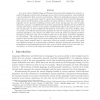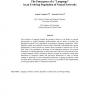130 search results - page 2 / 26 » Language networks: Their structure, function, and evolution |
COCOON
2006
Springer
13 years 8 months ago
2006
Springer
In a recent article, Nakhleh, Ringe and Warnow introduced perfect phylogenetic networks--a model of language evolution where languages do not evolve via clean speciation--and form...
CONNECTION
1998
13 years 4 months ago
1998
The evolution of language implies the parallel evolution of an ability to respond appropriately to signals (language understanding) and an ability to produce the appropriate signa...
ISMIS
2005
Springer
13 years 10 months ago
2005
Springer
Recently, there are many researchers to design Bayesian network structures using evolutionary algorithms but most of them use the only one fittest solution in the last generation. ...
SIGIR
2005
ACM
13 years 10 months ago
2005
ACM
We study the problem of offering publish/subscribe functionality on top of structured overlay networks using data models and languages from IR. We show how to achieve this by ext...
FUZZY
1994
Springer
13 years 8 months ago
1994
Springer
In this paper, evolution strategy is applied in order to improve the time series prediction accuracy of a Sugeno and Takagi type fuzzy inference system FIS. The presented approach...


